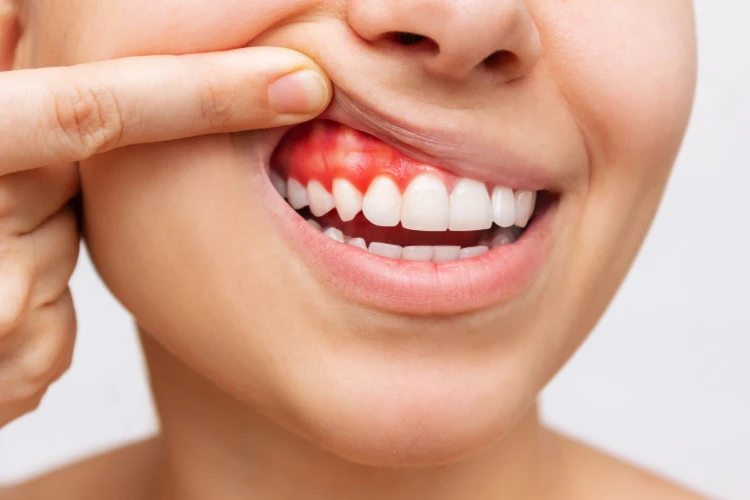How I Healed My Receding Gums – Do you suffer from receding gums? Are you experiencing tooth sensitivity, swollen gums, or bleeding while brushing? Don't worry! This comprehensive guide will provide you with effective and natural ways to heal receding gums and restore your oral health. By incorporating these remedies and tips into your daily routine, you can promote gum healing and prevent further damage.
Table of Contents
Understanding Receding Gums
Receding gums, also known as gingival recession, occur when the gum tissue surrounding the teeth wears away or pulls back. This exposes the tooth roots, making them more susceptible to decay and sensitivity. Gum recession is a common dental issue that affects people of all ages, but it is more prevalent in adults.
The primary causes of receding gums include poor oral hygiene,gum disease, aggressive brushing, hormonal changes, and smoking. These factors contribute to gum recession by damaging the gum tissue and weakening its attachment to the teeth. It is crucial to address the underlying cause to prevent further damage and promote gum healing.
Recognizing the Symptoms
Early detection of receding gums is vital for timely intervention and effective treatment. Here are some common symptoms to watch out for:
1. Tooth sensitivity: Exposed tooth roots can cause heightened sensitivity to hot, cold, or sweet foods and drinks.
2. Exposed tooth roots: Receding gums expose the roots of the teeth, making them appear longer than usual.
3. Swollen or tender gums: Gum recession can cause inflammation and discomfort in the gum tissue.
4. Bleeding while brushing: Gums that bleed easily when brushing or flossing may indicate gum disease and recession.
If you notice any of these symptoms, it is essential to consult with a dental professional for a proper diagnosis and personalized treatment plan.
Professional Treatment Options
In severe cases of receding gums, professional intervention may be necessary. Here are some common treatment options offered by dental professionals:
1. Gum grafting: This procedure involves taking gum tissue from another part of the mouth and grafting it onto the receding gums to cover exposed tooth roots.
2. Scaling and root planing: Also known as deep cleaning, this treatment involves removing plaque and tartar from the tooth surfaces and the root surfaces below the gumline.
3. Laser therapy: Using advanced laser technology, dental professionals can remove infected gum tissue, promote healing, and stimulate the growth of new gum tissue.
It is important to note that these treatments are tailored to individual needs and may not be suitable for everyone. Consulting with a dental professional will help determine the most appropriate course of action for your specific case.
Must Read: Tongue Sucking: Causes, Consequences, and How to Stop it
Natural Remedies to Promote Gum Healing
In addition to professional treatments, there are several natural remedies that can aid in the healing of receding gums. These remedies are safe, cost-effective, and easy to incorporate into your daily routine. Here are some effective natural remedies:
1. Oil pulling
Oil pulling is an ancient Ayurvedic practice that involves swishing oil in the mouth for a few minutes to improve oral health. Coconut oil or sesame oil is commonly used for this purpose. The oil helps reduce harmful bacteria, plaque build-up, and inflammation in the gums. Simply swish a tablespoon of oil in your mouth for 10-15 minutes, then spit it out and rinse your mouth with water.
2. Aloe vera gel
Aloe vera has soothing and anti-inflammatory properties that can help heal gum tissue. Apply a small amount of aloe vera gel onto your gums and gently massage it in for a few minutes. Leave it on for about 10 minutes, then rinse your mouth with water. Regular use can help reduce inflammation and promote gum healing.
3. Green tea
Green tea is rich in antioxidants that have anti-inflammatory properties. It can help reduce gum inflammation and promote gum health. Brew a cup of green tea, let it cool down, and use it as a mouthwash. Swish the tea in your mouth for a few seconds, then spit it out. You can also drink green tea regularly to enjoy its overall health benefits.
4. Saltwater rinse
A saltwater rinse is a simple yet effective remedy for reducing bacteria and inflammation in the gums. Dissolve half a teaspoon of salt in a cup of warm water and use it as a mouthwash. Gently swish the solution around your mouth for 30 seconds, then spit it out. Repeat this a few times a day to promote gum healing.
5. Vitamin C
Vitamin C is essential for gum health as it helps strengthen the connective tissues and promotes healing. Ensure you consume an adequate amount of vitamin C-rich foods like citrus fruits, strawberries, kiwi, and peppers. You can also consider taking a vitamin C supplement after consulting with a healthcare professional.
6. Herbal remedies
Certain herbs like chamomile, sage, and calendula have antimicrobial and anti-inflammatory properties that can help with gum healing. You can prepare herbal teas using these herbs and use them as mouthwashes or apply them topically to your gums for relief and healing.
It is important to note that these natural remedies should not replace professional dental care. They can be used as complementary measures to promote gum healing and overall oral health.
Oral Care Tips for Receding Gums
Proper oral care is crucial for preventing further gum recession and preserving gum health. Here are some essential tips to incorporate into your daily routine:
1. Brush gently: Use a soft-bristle toothbrush and gentle circular motions to clean your teeth and gums. Avoid aggressive brushing, as it can further damage the gum tissue.
2. Floss correctly: Clean between your teeth and along the gum line using proper flossing techniques. Be gentle to avoid causing irritation or injury to the gums.
3. Use a mouthguard: If you grind your teeth or clench your jaw, wearing a mouthguard while sleeping can help relieve pressure on the gums and prevent further recession.
4. Avoid tobacco and excessive alcohol consumption: Smoking and excessive alcohol intake can contribute to gum disease and hinder the healing process. Quit smoking and limit your alcohol consumption for better gum health.
5. Schedule regular dental check-ups: Routine dental visits are essential for monitoring gum health, detecting any issues early, and receiving professional advice on oral care.
Diet and Lifestyle Changes
Your diet and lifestyle play a significant role in gum health and the healing process. To support gum healing and overall oral health, consider the following:
1. Follow a balanced diet: Consume a nutrient-rich diet that includes fruits, vegetables, lean proteins, and whole grains. Avoid sugary and acidic foods that can damage the gums and teeth.
2. Stay hydrated: Drink plenty of water throughout the day to maintain saliva production, which helps cleanse the mouth and prevent bacterial growth.
3. Exercise regularly: Engage in regular physical activity to improve circulation and boost overall health, which indirectly benefits gum health.
4. Manage stress: Stress can contribute to gum disease and hinder the healing process. Practice stress management techniques like meditation, yoga, or deep breathing exercises.
The Role of Good Oral Hygiene
Maintaining good oral hygiene habits is vital for preventing gum disease and promoting gum healing. Follow these essential practices:
1. Brush properly: Brush your teeth at least twice a day using fluoride toothpaste. Brush in gentle circular motions, targeting all tooth surfaces and the gumline.
2. Floss regularly: Clean between your teeth and along the gum line using dental floss or interdental brushes. This helps remove plaque and food particles that can contribute to gum disease.
3. Use mouthwash: Rinse your mouth with an antibacterial mouthwash to help reduce bacteria and freshen your breath. Choose a mouthwash that is alcohol-free and specifically designed for gum health.
Conclusion
Receding gums can be a cause for concern, but with the right knowledge and proactive measures, you can promote gum healing and restore your oral health. Incorporate natural remedies, follow proper oral care techniques, make dietary and lifestyle changes, and seek professional advice when needed. By taking these steps, you can say goodbye to receding gums and enjoy a healthy, confident smile. Remember, your gums deserve the best care, so start implementing these tips today and embrace a brighter, healthier future for your oral health.
Must Read: 20 Home Remedies for Abscess Tooth – Get Quick Relief


